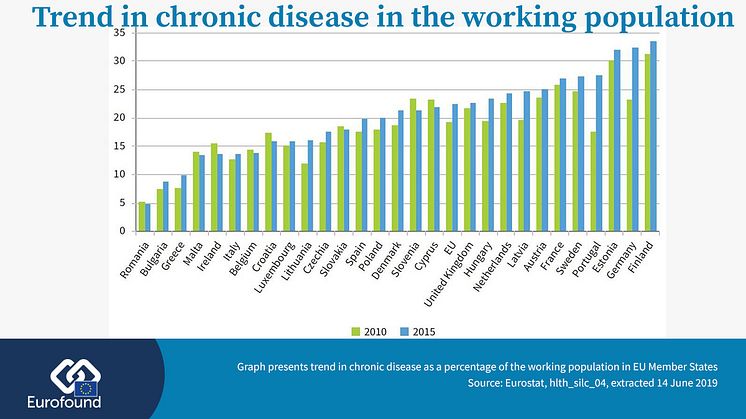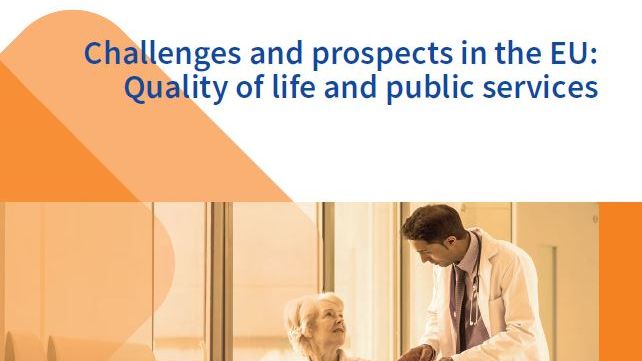
News -
Just one in three workers with limiting chronic disease in adapted workplace
Just one in three workers in the EU whose daily activities are severely or somewhat limited by a chronic disease report that their workplace has been adapted to accommodate their health problem. This means that most workers in Europe with a limiting health condition are not being supported in terms of workplace adaptation.
Eurofound’s new policy brief on how to respond to chronic health problems in the workplace combines European Working Conditions Survey and other EU and national level data to examine the prevalence and impact of chronic disease at work. It emphasises that long-standing health issues among workers will become an increasingly significant issue for Europe in the coming decades.
Europe has an ageing workforce, and a quarter of the EU working population already reports having a chronic disease. This share increased by 8 percentage points between 2010 and 2017. Workers over the age of 50 are more than twice as likely to have a chronic illness as workers under 35; but even among younger workers the share reporting chronic illness is rising - from 11% in 2010 to 18% in 2017 for under 30s. Some of the more common reported chronic conditions include musculoskeletal disorders, mental health conditions and cardiovascular disease.
This research on chronic disease has also highlighted inequalities in the labour market. Workers with low educational attainment and those in low-skilled occupations are not only more likely to have a chronic disease and experience limitations in their daily activities, they are also less likely to benefit from workplace accommodation.
Reacting to this particular finding, Oscar Vargas-Llave, one of the researchers behind the project, commented “the issue that people with lower educational attainment and those in lower-skilled occupations are more likely to be affected by chronic disease reflects the link between chronic illness and material deprivation, but the fact that they are less likely to have their workplaces suitably adapted raises the broader issue of fairness on the labour market”.
Workplace adaption is fundamental to ensure that workers with limiting chronic disease are engaged in quality and sustainable work. The policy brief notes that workers who have benefited from workplace accommodation report improved job quality and reduced stress, making it more likely for their employment to be sustainable. Effective accommodation does not have to be costly and contributes to the retention of highly skilled workers.
At the same time, over 40% of people with a limiting chronic disease who have had their workplace adapted believe that further accommodation will be required in the future, showing there is no one-off fix for this issue. Eurofound’s policy brief points to a number of areas for policy and legislative action, in particular that, despite the encompassing nature of the UN Convention on the Rights of Persons with Disabilities definition of disability, significant variation and uncertainty remains on the protection of individuals with chronic disease in national legislation and policy.
The growing challenges posed by chronic illness in the workforce necessitate further clarification, and guidance is needed on the coverage of chronic sickness in the context of EU non-discrimination legislation, particularly related to the right to reasonable accommodation. A review of the European Disability Strategy should seek to address this issue.

More information
- Download the policy brief ‘How to respond to chronic health problems in the workplace?’
- View more of our research based on the European Working Conditions Survey





